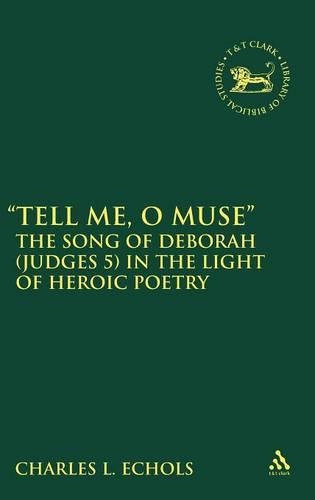
Tell Me, O Muse: The Song of Deborah (Judges 5) in the Light of Heroic Poetry
(Hardback)
Publishing Details
Tell Me, O Muse: The Song of Deborah (Judges 5) in the Light of Heroic Poetry
By (Author) Charles L. Echols
Bloomsbury Publishing PLC
T.& T.Clark Ltd
1st August 2008
United Kingdom
Classifications
General
Non Fiction
222.32066
Physical Properties
Hardback
256
540g
Description
The so-called Song of Deborah celebrates a decisive victory during the era of the Judges, and praises Jael and the Israelites for their defeat of a Canaanite coalition led by Sisera. Despite generations of scholarship, virtually every aspect of the poem remains disputed, because it has been misunderstood in previous research. This study explains both the enigmatic role of Yahweh of the poem and its heroic ethos through a comparative study of heroic poetry. Part I addresses preliminary critical issues, the most important being the poem's unity. Although the case for the poem's unity has merit, the stronger argument is that religious material was added. References to Yahweh occur in the original poem, but it is essentially profane, making it exceptional among comparable Hebrew poetry. How, then, do we account for a Yahwistic poem which primarily praises the human characters Part II establishes a basis of comparison for the original poem through a survey of heroic poetry. After determining that the original poem is not the narrative type, subgenres of the lyric family are analyzed. Of these, the victory song corresponds most closely to the poem. The results of the survey of heroic poetry are then used to determine whether the poem is heroic. The poem is assessed for heroic and non-heroic features, and the results indicate that it is indeed a heroic victory song. The refinement of the generic classification reveals a new literary genre in the Hebrew Bible and the social context from which the poem arose as well as explains the enigmatic role of Yahweh in the poem.
Reviews
Reviewed in Religious Studies Review, Vol. 36, No. 2, June 2010 (UK) An interesting re-examination of old issues in an attempt to pin down answers to still unanswered questions about the Song of Deborah'
Author Bio
Charles L. Echols, Ph.D., is a life member of Clare Hall, Cambridge, and has research interests in the early history and religion of Israel.He lives in Stapleford, Cambridgeshire with his wife and daughter.
